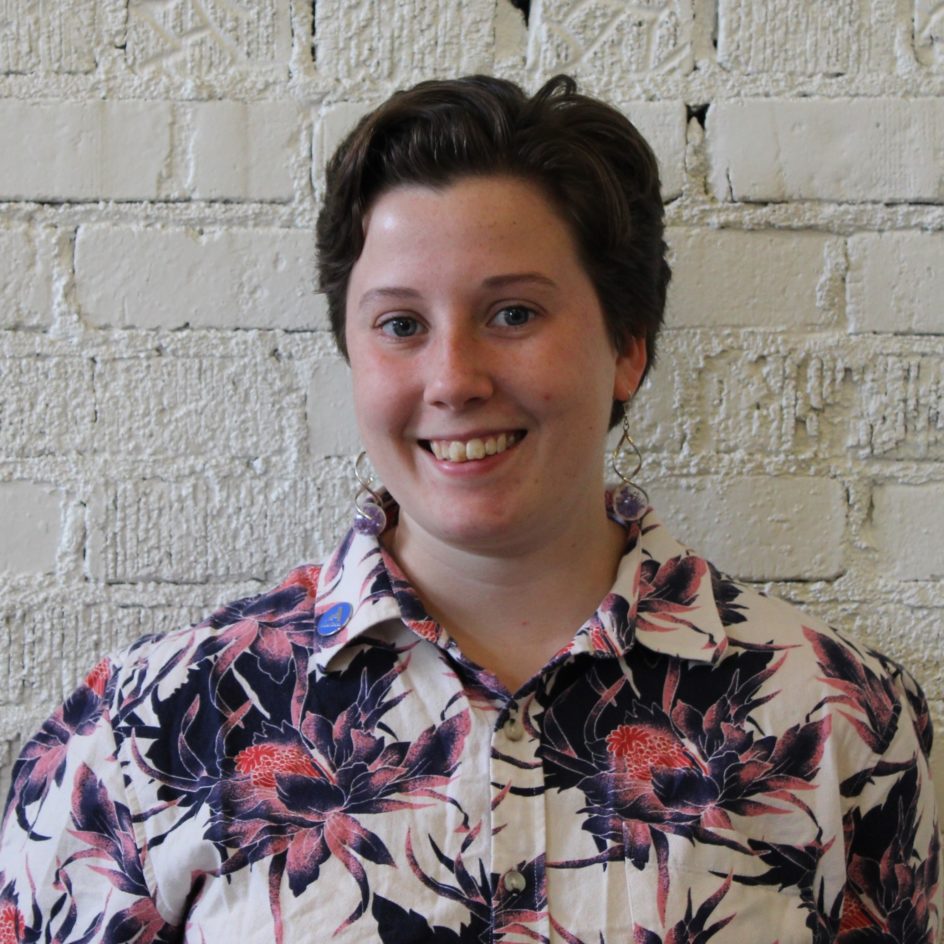Alex Corpuz enjoys tackling complex—and sometimes knotty—issues and ideas.
They began college at the Ohio State University in August 2018 as a physics and engineering student. During their sophomore year, they realized they were having more fun doing their German homework than their physics homework.
This past spring, they graduated with degrees in German and Medieval Studies. Before heading to graduate school for a doctorate in medieval history, they are completing a year of service with Ohio Humanities as a member of the Ohio History Service Corps, one of two history-focused state AmeriCorps programs in the nation.
As part of the Ohio History Service Corps, Alex works with local history sites in Central Ohio, including the Licking County Historical Society, where they provide capacity building support. Alex advises on best practices for collection preservation and strategic planning. They are building long-term relationships between their outreach sites and Ohio Humanities that will continue even after Alex’s service ends.
History organizations and museums often face the challenges of needing space and lacking the resources to preserve everything. Alex explains, “there’s the tension of we don’t know what’s going to be important in two-hundred years.” At the same time, “things that get thrown away are things we no longer have evidence of.”
Alex sees Ohio Humanities as having an important role to play.
“In the tension of wanting to preserve everything, Ohio Humanities has a mediator role. They’re doing the active work of trying to get to the stories that might otherwise be ‘thrown away.’ They have the resources to help communities keep their ‘artifacts,’ those artifacts being stories.”
One story that Alex is exploring is the fight for school desegregation in Hillsboro, Ohio. Following the Brown v. Board of Education decision in 1954, a group of eighteen Black mothers led the struggle to integrate an all-white elementary school in Hillsboro. Every day for two-and-a-half years, they marched their children to the school and demanded admission. They were turned away again and again. The mothers homeschooled their children while their protest and legal case unfolded, finally achieving victory in 1956.
To support future projects related to the Hillsboro civil rights struggle, Alex has been conducting primary source research in the digitized records of the National Association of the Advancement of Colored People (NAACP). They are likely the first researcher to go through these records in search of details about the Hillsboro school desegregation battle.
Alex has sifted through hundreds of pages of documents to find nuggets about Hillsboro, often aided by the “control find” function.
“Doing embroidery, I would take the skeins of floss and wouldn’t wind them on winders, and it got super tangled. I spent a solid couple of months untying the knots and sorting the threads. The process of going through the NAACP papers felt like untangling the embroidery floss, doing my best to find the threads that I needed, the ones that helped me untangle the story, and the ones that I maybe needed to put aside for later. It’s a very difficult but very gratifying process.”
Alex attempted to approach this history with fresh eyes and an open mind. By researching the Hillsboro case in the papers of a major civil rights organization, interesting connections emerged between the local and national battles over integration. They discovered that school integration activists in Englewood, New Jersey, requested the assistance of Russell L. Carter, a Dayton attorney who represented the Hillsboro mothers. Hillsboro was part of a national story, and the leaders were connected to a broader fight for school desegregation.
Carter, a World War II veteran and Harvard Law School graduate, became the first Black judge in Dayton, the second Black judge in the state, and the first Black candidate for statewide election in Ohio. Alex explains that Carter “ended up being a really influential figure. That’s not something that you would think would come out of this Hillsboro story” as it wasn’t “part of the national papers’ coverage of the Hillsboro story.”
After reading dozens of newspaper articles and hundreds of documents about Hillsboro, Alex has a new appreciation for local history.
“I intend to go to grad school for medieval history, which spans centuries and whole continents, to look for where we came from. I’m enjoying local history because it’s so different from medieval history, but it goes just as deep, if not more so. Ohio’s local history needs to be studied so that we can continue to create a rich tapestry of our own history and see that much more intimately where we come from.”
Alex Corpuz: Alex is an AmeriCorps Member placed with Ohio Humanities for the 2022-2023 service year through the Ohio History Service Corps, one of two history-focused state AmeriCorps program in the nation. They are a recent graduate of the German and Medieval and Renaissance Studies departments at the Ohio State University. Alex lives in Clintonville with their spouse and Whispers, a toothless tortoiseshell cat.
Ohio History Service Corps: Since 2010, the Ohio History Service Corps, an AmeriCorps program administered by the Ohio History Connection, has been working with local history organizations and communities in each of ten Ohio Local History Alliance regions throughout the state. They provide coaching and training to help organizations become more effective and sustainable, and help communities take the first step in historic preservation.

